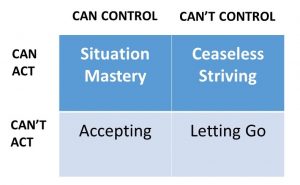by Alex Tang
We are living in fear. One tiny RNA virus named SARS-CoV-2, averaging 0.125 micron in length, brought our civilization as we know it to its knees and caused great health and socio-economic disruptions. With the COVID-19 pandemic infecting 35 million people with more than a million deaths, all of us irrespective of our social status, ethnicity or country’s healthcare level of care are at risk. Especially vulnerable are those who are over 65 years of age with co-morbidities. Countries, states and cities are forced into lockdowns where everyone is confined to their homes to prevent the spread of the virus. The economic ramifications of the lockdowns with retrenchments, closing of companies and millions falling below the poverty line is a sad unfolding drama. For many of us, our fear is our constant companion in these times. We are fearful of our health, our safety, our future and of the future of our communities. After about seven months, this fear has permeated into our subconscious and is manifesting as irritability, anger, anxiety and depression. Often we do not know why we are feeling the way we do. Some people have cleverly named it “Covid-19 fugue” but it is actually a bondage of fear. This bondage of fear kept us blind to the very thing we need – hope.
Zephaniah, a minor prophet speaking at a time of great socio-economic disruptions caused by the Babylonian conquest (death, pestilence, famine), noted, “The LORD your God is with you, the Mighty Warrior who saves. He will take great delight in you; in his love he will no longer rebuke you, but will rejoice over you with singing” (Zephaniah 3:17 NIV). While we are in bondage, it is easy to lose sight of the Lord who offers hope. Instead, we are drawn into the downward spiral of fear, anger and anxiety to deep depression. This depression is different from the medical condition depression which needs expert psychiatric/psychological help and sometimes medications. This depression caused by the bondage of fear is caused by our present circumstances, the resilience of our spirits, and the power of principalities and power that hold sway in this fallen world.
Paul writing to the Corinthian Christians who lived in a world similar to ours with its natural and socio-political disruptions explained how to break the bondage of fear in 2 Corinthians 10:3–5 (NIV)
3 For though we live in the world, we do not wage war as the world does. 4 The weapons we fight with are not the weapons of the world. On the contrary, they have divine power to demolish strongholds. 5 We demolish arguments and every pretension that sets itself up against the knowledge of God, and we take captive every thought to make it obedient to Christ.
With the spiritual weapons supplied by the Holy Spirit, we can take responsibility for our mental health by breaking the bondage of fear. There are three steps we can take to break this bondage of fear.
First, we name the fear. Naming, in the biblical sense, is knowing. We have many fears so it is helpful for us to ask the Holy Spirit to help us identify or name them. Then we subject each of these fears to the following rubric.
 1. A fear situation where we have control and can act – situation mastery
1. A fear situation where we have control and can act – situation mastery
This is a situation where we have the ability to control and to take action. One example is washing hands, wearing masks, staying at home, social distancing and attending services online. Here we have situation mastery. There is no need to fear being infected by the virus.
2. A fear situation where we can’t control but can act – ceaseless striving
A situation where we can do something but are in a situation where we have no control over. One example is a person suffering from cancer. That person has no control over the cancer in his/her body. However, the person can do something about seeking treatment. Often, many people are not satisfied with sticking to the treatment of a medical oncologist. They will try alternative medical treatments, faith healings, herbs and even some obscure claims from the internet. This is ceaseless striving. Our fear drives us to keep striving, often in vain.
3. A fear situation where we can control but can’s act – accepting
Here is a situation where we have control but can’t act. This is often a very fearful situation as our natural instinct is to do something. Not being able to do anything is very stressful and anxiety provoking. One example is if we own a hotel, we have total control over the total operations of the hotel. Unfortunately, our hotel is in a country or city under pandemic lockdown. We cannot act to get guests because of the movement control order. We fear that we will lose the hotel to the bank. Millions of business owners, especially the smaller ones, live with this fear. It is also likely that many churches will be closing because of the pandemic.
4. A fear situation where we can’t control and can’t act –letting go
There are situations we find ourselves in that we have no control over and there is nothing we can do about it. Some of us live in fear for our loved ones who live in another country or city. We not only worry for their safety but we fear for them too. These are very fearful situations but if we are able to name them, we can break the bondage of these fears.
Second step after naming our fears is to befriend them. If our fear falls under the category of situation mastery, do something about it. We will find that the hold fear has on us, as we do something about the situation, lessening. In the ceaseless striving category, we should choose to be realistic and not just act to do something. In the last two categories, it is about accepting and let the Lord do what He has purposed for our lives. This is where trust and hope come in.
The third and final step is to continue praying. Fear will always try to keep us in bondage and away from our trust and hope in God. We have to be vigilant in our thinking. Do not be distracted and let our thoughts be drawn to where our fears dwell, especially in ceaseless striving and areas where we must let go and let God. It is so easy to be drawn back into the bondage of fear. Paul has the antidote for us in Philippians 4:6–8 (NIV)
6 Do not be anxious about anything, but in every situation, by prayer and petition, with thanksgiving, present your requests to God. 7 And the peace of God, which transcends all understanding, will guard your hearts and your minds in Christ Jesus. 8 Finally, brothers and sisters, whatever is true, whatever is noble, whatever is right, whatever is pure, whatever is lovely, whatever is admirable—if anything is excellent or praiseworthy—think about such things.
We are living in difficult and fearful times. Frederick Buechner in Beyond Words: Daily Readings in the ABC’s of Faith writes, “Here is the world. Beautiful and terrible things will happen. Don’t be afraid.” It is easy to let our fears take control of our lives. We may be living in bondage to fear without knowing it. God has given us the means to break this bondage and the freedom to live with our fears. The key is trust and hope in the Lord. May we live in freedom from fear. Reinhold Niebuhr’s Serenity Prayer is a good guard against living in bondage of fear.
God, give me grace to accept with serenity
the things that cannot be changed,
Courage to change the things
which should be changed,
and the Wisdom to distinguish
the one from the other.
Living one day at a time,
Enjoying one moment at a time,
Accepting hardship as a pathway to peace,
Taking, as Jesus did,
This sinful world as it is,
Not as I would have it,
Trusting that You will make all things right,
If I surrender to Your will,
So that I may be reasonably happy in this life,
And supremely happy with You forever in the next.
Amen.
——————–
Alex Tang is an author, spiritual director and practical theologian. Visit his website Kairos Spiritual Formation at www.kairos2.com

